Key takeaways:
- The global legislative landscape is increasingly interconnected, with countries collaborating on issues like climate action and digital rights.
- Technological advancements, particularly in AI and blockchain, are shaping new legal frameworks and legislative processes, emphasizing the need for agile laws.
- Grassroots movements and international standards will play crucial roles in driving future legislative changes, fostering a more responsive and inclusive legal environment.
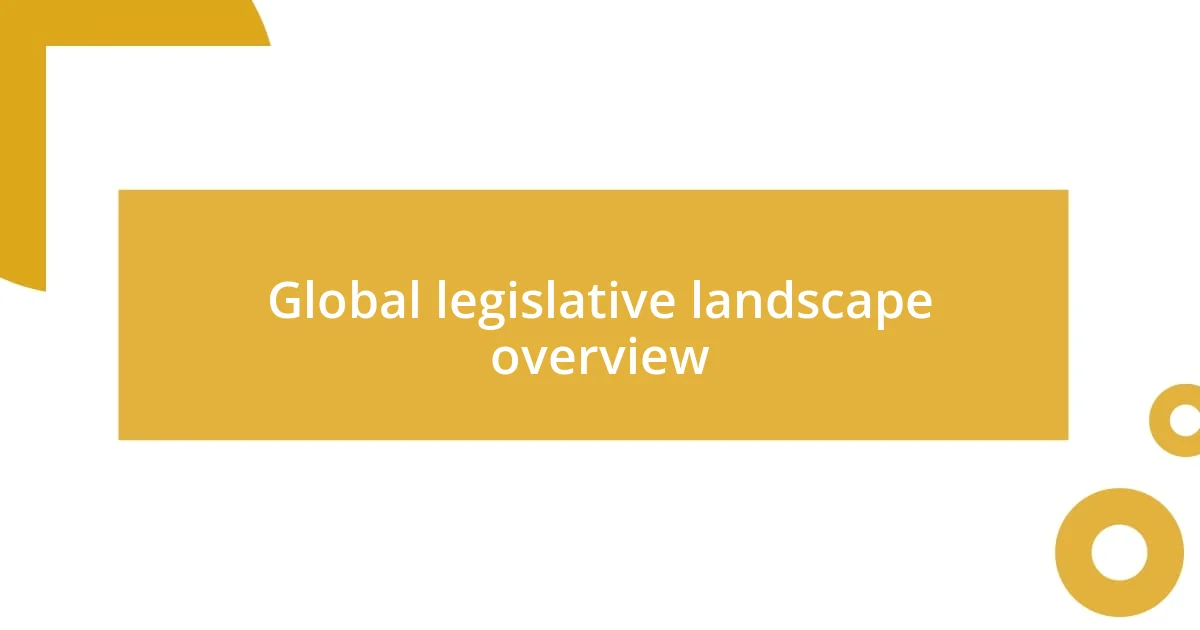
Global legislative landscape overview
The global legislative landscape is incredibly dynamic, influenced by a mosaic of cultural, economic, and political factors. I remember attending an international conference where delegates shared how local customs and laws often intersect in unexpected ways, driving home the point that legislation can never be viewed in isolation. Isn’t it fascinating how a single bill can ripple across borders, affecting nations that might seem worlds apart?
As governments navigate challenges like climate change, digital rights, and health care, we see a trend toward more collaborative frameworks. I often reflect on how countries are starting to recognize that issues like data privacy aren’t just national concerns but global imperatives demanding cooperation. Have you ever considered how the legislative choices made in one country could shape policy debates in another?
Additionally, the rise of technology plays a pivotal role in shaping modern legislation. I once spoke with a legislator who emphasized the need for laws to evolve at the pace of tech innovations—like artificial intelligence and blockchain—without stifling growth. This constant balancing act makes me wonder: can legislation truly keep up with the speed of change, or do we often find ourselves one step behind?
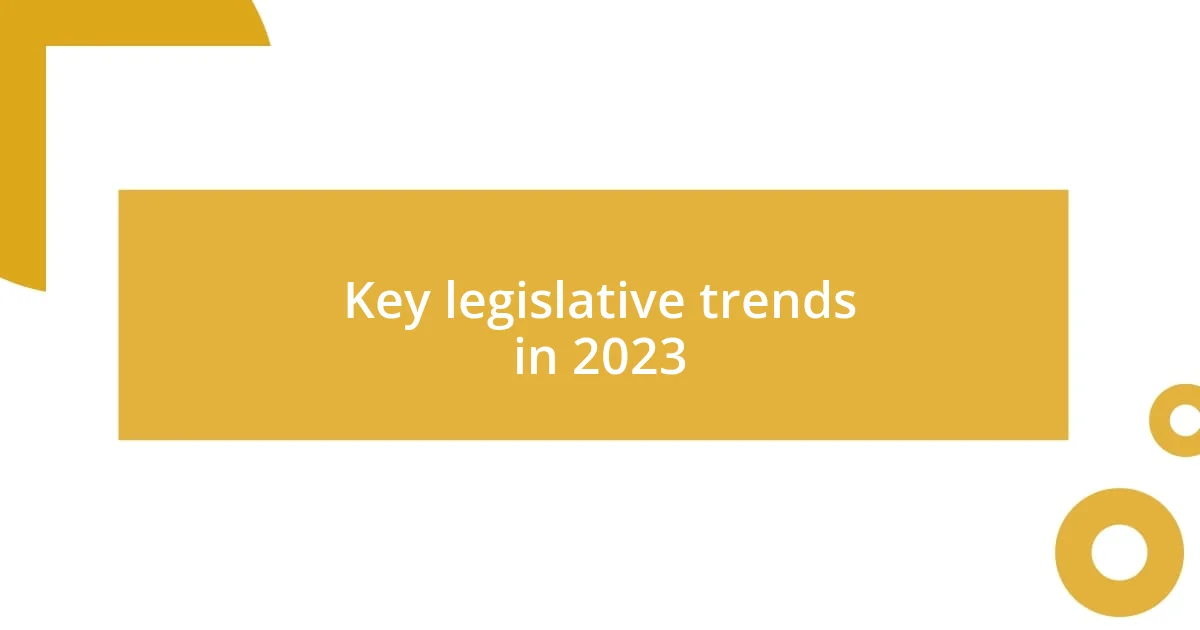
Key legislative trends in 2023
This year, I’ve noticed a surge in legislative efforts aimed at sustainability and environmental protections. Countries are grappling with the pressing demands of climate action, and I can’t help but recall the discussions I had with environmental advocates who passionately argued that innovative policies can help mend our planet. It’s encouraging to see that governments are not just paying lip service to these ideals, but are actually drafting concrete laws that promote renewable energy and reduce carbon footprints.
Key trends I’ve observed include:
– Strengthened climate commitments: Multiple nations are enacting stricter emissions targets.
– Corporate accountability: New regulations require businesses to disclose their environmental impact.
– Investment in green technology: Legislation is actively supporting R&D in renewable resources.
Additionally, there’s a palpable shift towards digital rights and data protection laws. Reflecting on my own experiences navigating privacy policies, I’m reminded of the frustration many feel regarding the murky waters of consent and data ownership. As these discussions gain traction in legislative bodies, I see a potential for significant change that could empower individuals and reshape how technology companies operate.
- Universal data protection frameworks: Countries are exploring harmonized data privacy laws.
- Enhanced consumer rights: Legislators are focusing on giving users clearer control over their information.
- Increased penalties for breaches: Stricter consequences for non-compliance with data regulations are being proposed.
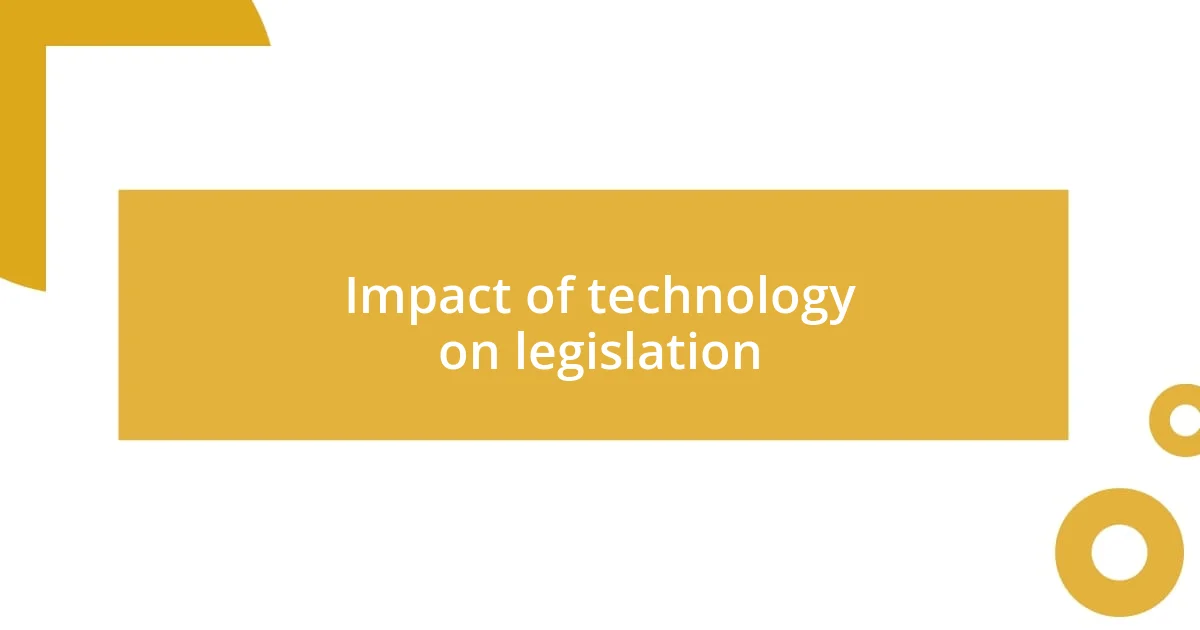
Impact of technology on legislation
The integration of technology into the legislative process has transformed how laws are conceived and implemented. I recall the excitement I felt attending a virtual town hall meeting, where constituents from various backgrounds shared their thoughts in real-time about proposed legislation via online platforms. This not only democratized the process but also highlighted the power of instant feedback. Isn’t it remarkable how technology facilitates communication between lawmakers and citizens, making the legislative process more transparent and inclusive?
We also see emerging technologies influencing the types of legislation being introduced. For example, during a recent discussion with tech experts, I was struck by how artificial intelligence is impacting regulations around labor and employment. As companies utilize AI in hiring, lawmakers must grapple with questions of bias and fairness. It left me pondering: how do we craft laws that protect individuals without stifling innovation?
Furthermore, the rise of blockchain technology is compelling lawmakers to rethink traditional legal frameworks. I remember a moment in a seminar where we explored how smart contracts can automate agreements, reducing the need for intermediaries. This shift presents exciting opportunities, but it also raises complex legal challenges. How do we ensure that these innovative solutions align with existing legal structures?
| Technology Impact | Legislative Response |
|---|---|
| Facilitated Communication | Increased public engagement through online platforms |
| AI in Employment | Developing regulations to address bias and protect workers |
| Blockchain Evolution | Creating legal frameworks for smart contracts |
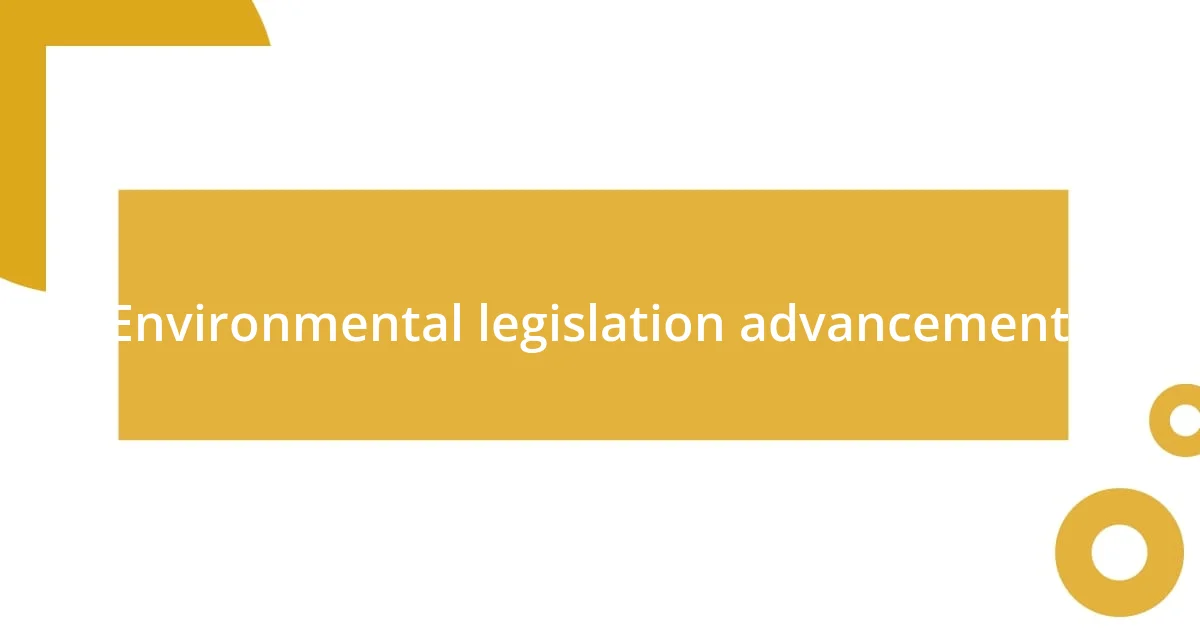
Environmental legislation advancements
As I reflect on recent advancements in environmental legislation, I can’t help but feel a sense of hope. For instance, when a recent global summit concluded with countries pledging to achieve net-zero emissions by 2050, I felt energized. These ambitious targets signify a collective understanding that we must act now, which brings me to consider: how will these commitments translate into tangible actions on the ground?
I’m struck by the growing call for corporate accountability in environmental matters. Just the other day, I engaged in a lively discussion with friends who run small businesses about the new requirements for environmental impact disclosures. Their concern for transparency is palpable, and it made me realize that such regulations not only hold larger corporations accountable but also empower consumers to make informed choices. Isn’t it refreshing to see businesses being pushed toward more sustainable practices?
Investment in green technology legislation resonates deeply with me as an advocate for innovation. I remember attending a local innovation fair where startups showcased their eco-friendly solutions. The excitement in the air was contagious, and it became clear that legislative support can catalyze these efforts. With governments now backing research and development in renewable resources, I wonder how many groundbreaking solutions are waiting just around the corner, ready to change our world for the better.
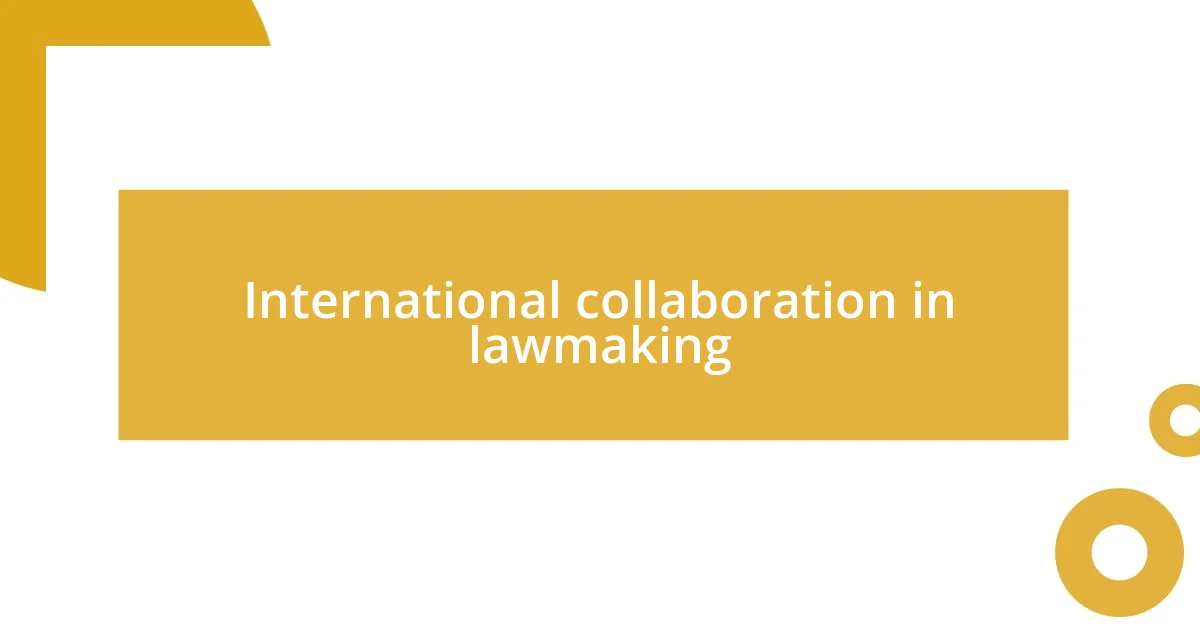
International collaboration in lawmaking
The essence of international collaboration in lawmaking has always fascinated me. Recently, I participated in a roundtable discussion with legislators from different countries, and it was enlightening to see how much common ground we share on pressing issues. It left me thinking: how can we create a framework that not only respects each nation’s sovereignty but also fosters the sharing of effective legal practices?
I’ve witnessed firsthand the impact of collaborative treaties, especially in areas like data protection. In one instance, I attended a workshop where representatives discussed the General Data Protection Regulation (GDPR) and its ripple effects beyond Europe. It struck me how these collective efforts can set benchmarks that resonate globally, encouraging countries to establish robust legal protections while adapting them to their unique contexts.
There’s something powerful about countries coming together to address global challenges, such as climate change and cybersecurity. I remember feeling invigorated during a conference where lawmakers and experts united to craft a shared policy on cross-border cybercrime. The energy in the room was palpable, underscoring a simple truth: collaborative lawmaking can lead to innovative solutions that single nations might struggle to achieve alone. Why should we navigate these complexities in isolation when teamwork can amplify our effectiveness?
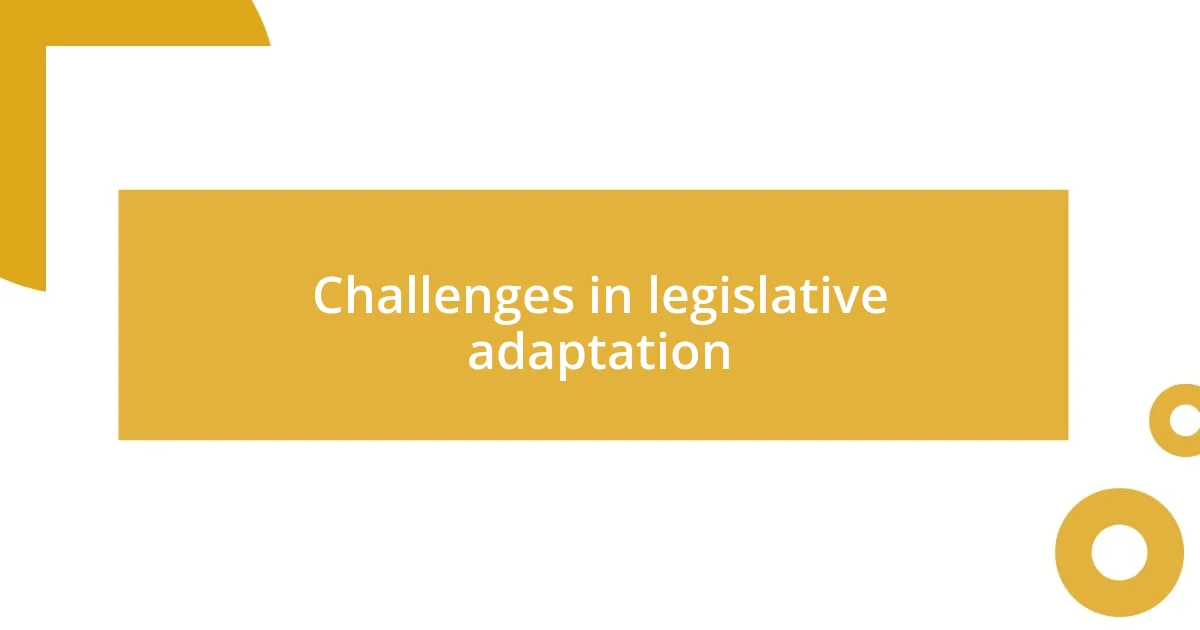
Challenges in legislative adaptation
Navigating the landscape of legislative adaptation is no small feat. One challenge I’ve observed is the disconnect between rapidly evolving societal needs and the slower pace of legal frameworks. I remember attending a local town meeting where community members voiced frustrations over outdated regulations that didn’t address current environmental concerns. It made me realize how critical it is for lawmakers to be agile and responsive, lest they lose touch with the very constituents they aim to serve.
Another significant hurdle lies in the diverse legal systems across countries. This variation can complicate international cooperation, as I learned firsthand during a cross-border meeting on trade regulations. There was palpable tension when delegates struggled to reconcile differing national interests. It left me pondering: how can we foster adaptability in laws while respecting unique traditions and legal principles? Achieving that balance often feels like trying to thread a needle.
Finally, I can’t overlook the challenge of public engagement with legislative processes. I recently encountered some friends who were unaware of crucial regulatory changes affecting their neighborhoods. Their bewilderment made me realize that legislators must prioritize transparent communication. How can we expect people to adapt to new laws if they’re not even aware of them? I believe that building a more informed public can pave the way for smoother legislative adaptation and ultimately, more effective governance.
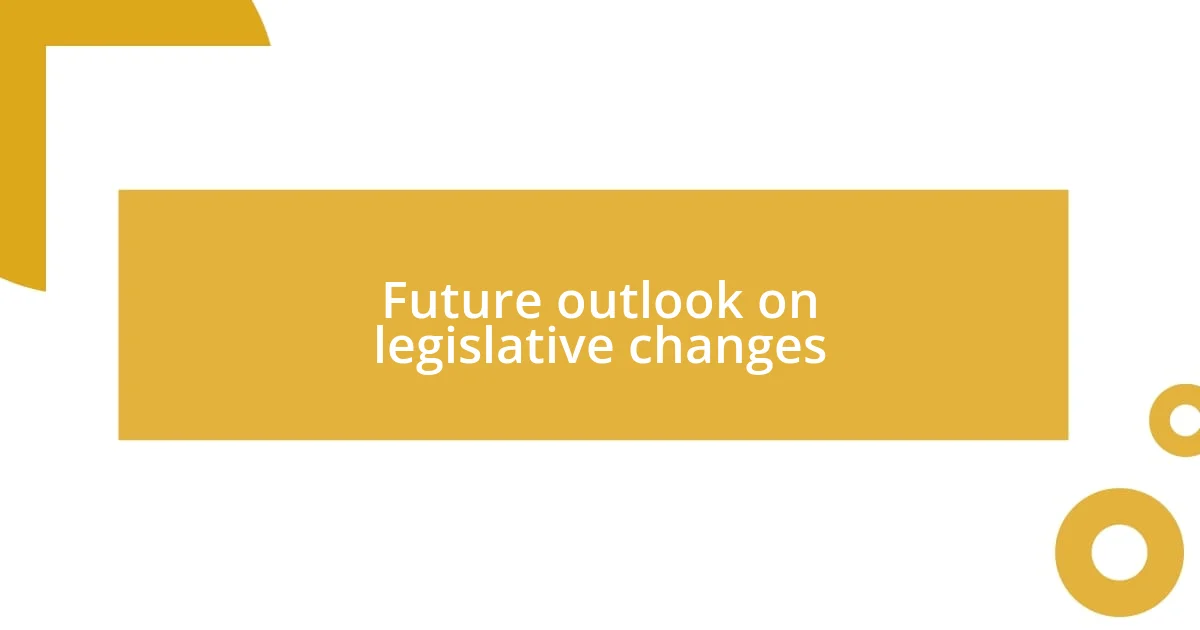
Future outlook on legislative changes
The future of legislative changes is undoubtedly dynamic. I remember a recent conversation over coffee with a friend who’s an aspiring policy analyst. We discussed how advancements in technology are likely to drive new laws—think about how emerging technologies like artificial intelligence pose ethical questions that existing legal frameworks can barely touch. Will legislators be prepared to tackle these issues head-on, or will we lag behind in developing a responsive legal landscape?
As I reflect on global trends, I can’t help but feel optimistic about the prospects of progressive legislation. During a recent seminar, I encountered passionate advocates fighting for social justice, and it reignited my belief that grassroots movements will shape future policy. What will it take for lawmakers to prioritize public sentiment? Perhaps, cultivating robust platforms for citizen input could lead to more equitable laws that truly reflect the needs of the populace.
Moreover, the ongoing globalization of our world means that legislative changes will likely be influenced by international standards and agreements. I recall attending a two-day forum where representatives from various nations shared their strategies for adapting to climate change. Their diverse perspectives highlighted a vital point: forthcoming regulations will need to be interconnected and collaborative. How can we ensure that our future laws are not just reactive but also visionary? Embracing the lessons from these discussions will be essential for crafting comprehensive legal frameworks that can withstand the test of time.















